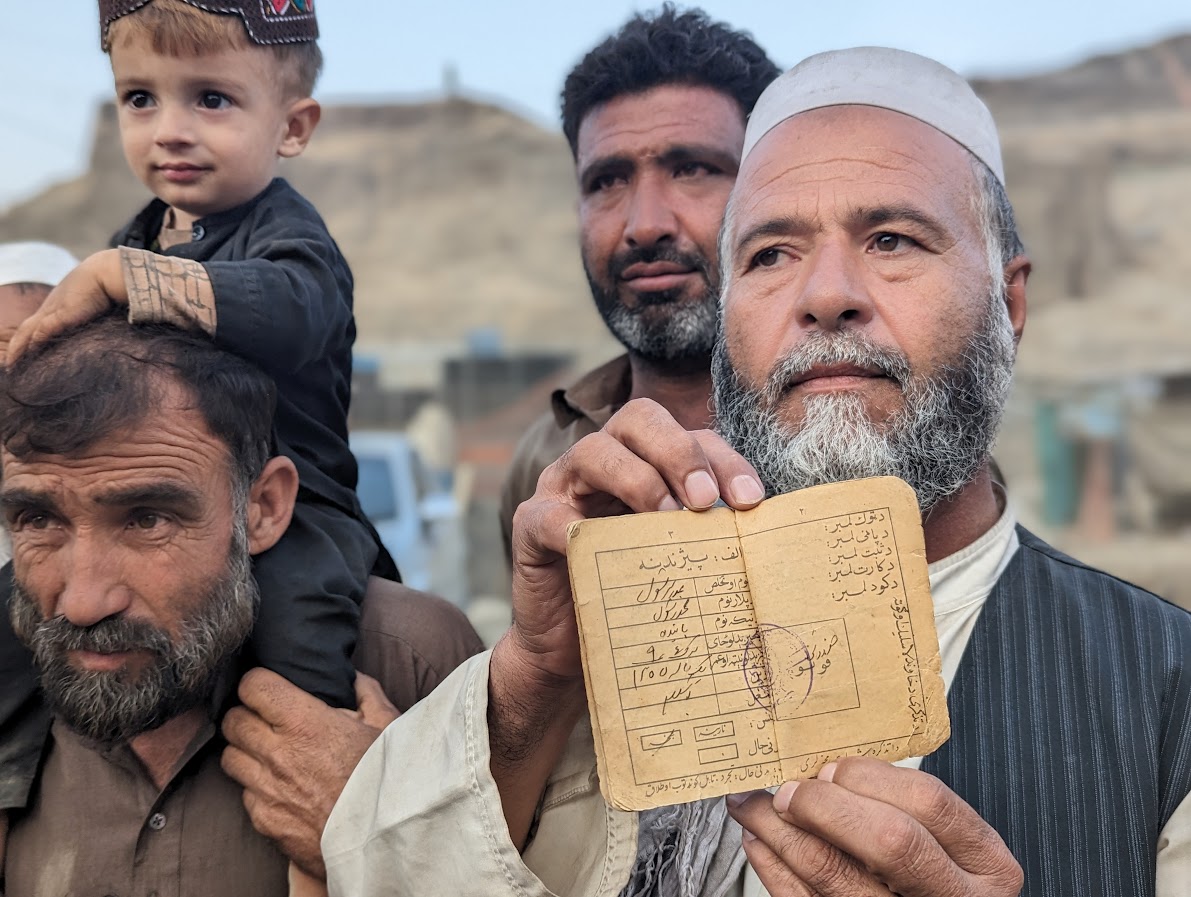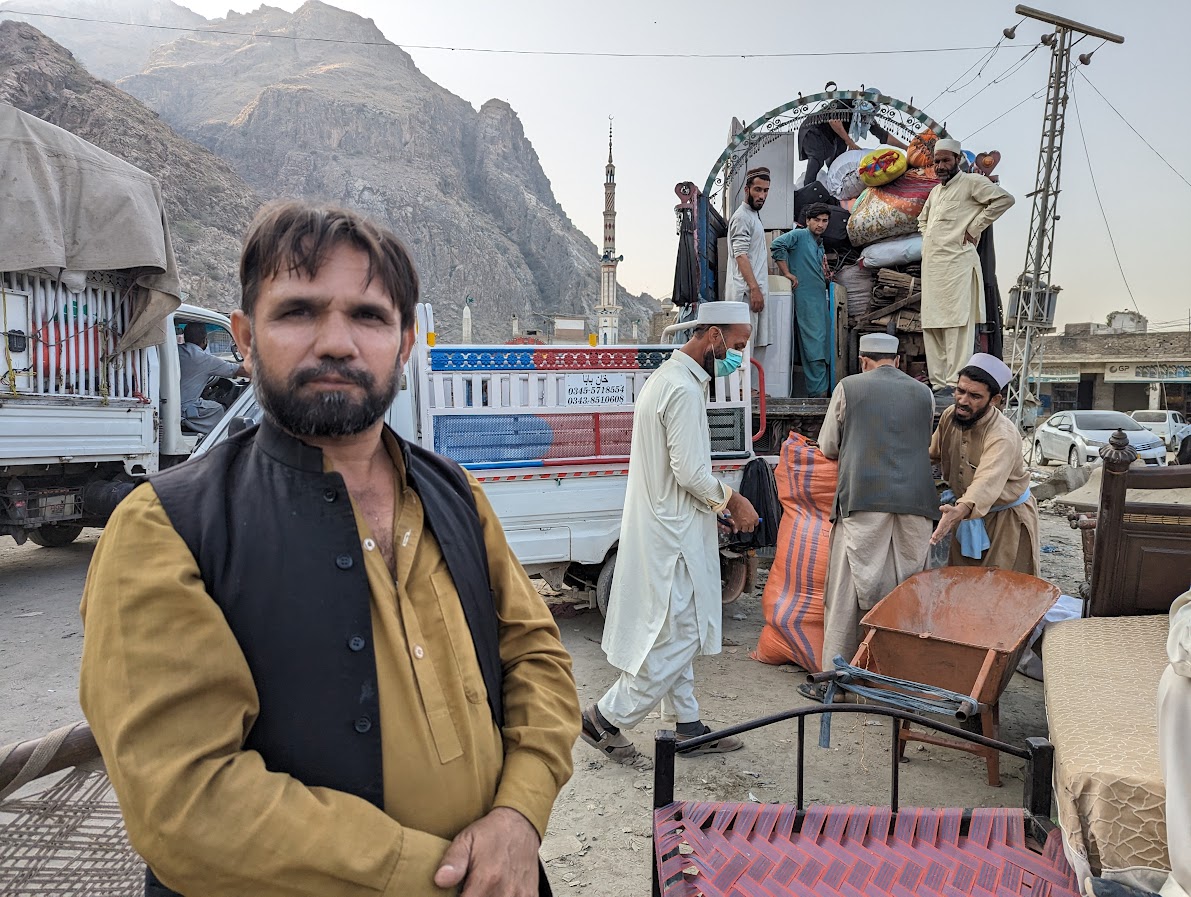
Torkham, Pakistan – Crumpled, dirty clothes. Worn-out slippers. And eyes dimmed from exhaustion.
Abdul Rasul had the look of a man who had not slept for days as he pushed the wheelchair of his 26-year-old sister, Fari Bibi, whose face mask bore the colours of the former Afghan flag.
The patriarch of a 46-member household — one that includes his six sons and their families, two sisters, his maternal cousins, their wives and children — Rasul had travelled for more than 48 hours to arrive at Torkham, a Pakistani town on the border with Afghanistan.
There he joined thousands of foreigners preparing to leave Pakistan due to a crackdown on undocumented migration. “I came to this country when I was four years old with my father,” Rasul explained. “I still have my Afghan identification document from when I used to live there. My siblings were born in Pakistan. My parents and grandparents are buried in Pakistan. Please tell me, why am I being sent back?”
On October 3, the Pakistani government ordered all undocumented foreigners to leave the country or face expulsion. Rasul packed his large household’s belongings into a shipping container atop a truck for the 250km (155-mile) trip from the city of Rawalpindi to the Afghan border.
Pakistan, a country of 241 million people, has a population of more than 4 million Afghans. About 2.4 million of them have some form of government-approved documentation. Another 1.7 million Afghan nationals, the government says, have no paperwork at all.

‘This isn’t humanity’
While Pakistan has accepted Afghan refugees in the past, a recent surge in violence by armed groups with roots in Afghanistan has soured public opinion and triggered a backlash against them.
Pakistan’s government has blamed Afghan nationals for the increase in violence in the country, including two suicide bombings at mosques in September. In the wake of the violence, the Pakistani government gave undocumented foreigners a deadline to exit the country by the end of October.
Several politicians, rights organisations and other groups have condemned the government’s decision, saying it singles out vulnerable Afghan citizens for whom returning might not be safe — and many, like Rasul, have been threatened with deportation despite having government-approved identification documents.
Pakistan has hosted millions of Afghan refugees since the Soviet invasion of Afghanistan in 1979. The last wave of migration came in August 2021 when the Taliban returned to power in Afghanistan, leading another 600,000 to 800,000 Afghan nationals to flee to Pakistan.
The Pakistani government has denied targeting citizens of any one country. It has maintained that its decision was made in accordance with international laws for the “welfare and security” of its people.
But Rasul, who worked as a security guard for more than 29 years in Rawalpindi, accused interim Prime Minister Anwar-ul-Haq Kakar and Interior Minister Sarfaraz Bugti of reneging on promises to only expel undocumented migrants.
“Didn’t Kakar and Bugti and all the other ministers come on TV and say anybody with legal documentation will not be thrown out?” he asked, showing the government-approved Afghan citizenship card he and his family members received in Pakistan in 2017. “The police came to our house and humiliated and forced us out on October 31, even though my landlord tried to stop them. This isn’t justice. This isn’t humanity.”

‘How many times do I have to move countries?’
Convoy upon convoy of Afghan citizens arrived at the Torkham border crossing on Thursday afternoon. They came in private vehicles and on trucks and wagons.
They walked the final 500 metres (550 yards) on a dusty, broken road to enter the immigration processing area, and from there, they made their way into Afghanistan after completing the formalities. According to the Pakistani government, as of Thursday, more than 150,000 people have gone back to Afghanistan since the deportation threat was announced.
They include 25,000 who crossed over on Wednesday, the first day after the deadline.
Ghazi Amanullah, a senior immigration official at Torkham, told Al Jazeera that an overwhelming majority of the people who are crossing are families who don’t have sufficient documents to stay in Pakistan and are moving back to Afghanistan “voluntarily”.
“We have so far processed between 3,000 and 4,000 people today,” he said on Thursday afternoon, “and we expect to continue working till late in the evening to complete paperwork for as many families as possible.”
Behind him were hundreds of Afghan men, women and children who awaited their turn to submit their papers at multiple immigration counters. They sat in a large makeshift hall covered by a carbon-fibre roof.
Khair Muhammad, a 47-year-old Afghan, was helping to unload his household’s belongings from a truck outside the border crossing as his family joined the queue inside. A fruit seller in Punjab’s Dina city, Muhammad said he and his family of six were still in shock at being forced out of their rented house after police “harassed” them.
“I am tired. How many times do I have to move countries to protect myself and my family?” he asked.
Muhammad said he and his parents first moved to Pakistan in 1991 when Afghanistan was undergoing a civil war, two years after Soviet forces vacated the country. In 2004, he moved back to Jalalabad, his hometown in Afghanistan, after Hamid Karzai took the reins as president following the United States invasion, which removed the Taliban from its first stint in power.
But in 2021, the Taliban returned to rule the country, and Muhammad and his family fled once more.
“Pakistan has given me a lot and shielded me twice. But to kick us out again with such short notice is cruel to us,” he said. “We don’t know what awaits us, nor do I have any immediate family there. I don’t even know where I will keep my family.”

‘Can’t forget the cruelty’
The Pakistani government said it aims to expel only foreigners without documentation, but more than 10 families whom Al Jazeera spoke to at the border said they had the appropriate paperwork and were still forced to leave.
Speaking in fluent Urdu without any trace of an accent, 32-year-old Muhammed Zahid said he was born in Pakistan and knows no other country as his home.
“I got my Afghan citizenship card thanks to my parents, both of whom have now passed away and are buried here,” he explained, surrounded by members of his 16-person family. “My brother is married to a Pakistani woman, and he is being forced to leave her behind because the police are harassing us and not accepting his document.”
Calling the last few days the “most miserable” of his life, Zahid alleged his landlord kicked him out in collusion with police. The landlord, he added, pocketed the rent he had paid for the following month. “I have spent more than 200,000 rupees [$707] in rent for the container,” he said, gesturing to the massive metal box perched atop a truck, holding his belongings.
While the women and children of Zahid’s family were walking towards the immigration counter, his brothers unloaded beds, a washing machine, bedsheets and water coolers from the container.
“We have spent two nights under the open sky and in the rain, going to a country where we don’t know anybody — no family — and with no money,” he added.
But for Rasul, it was the helplessness he felt that made his voice ripple with anger.
“The cruelty and the humiliation by the government and police are what I cannot forget,” he said. “When our family was leaving, our neighbours hugged us and cried with us. How can you push somebody out who knows no other country, no other language, no other life?”





